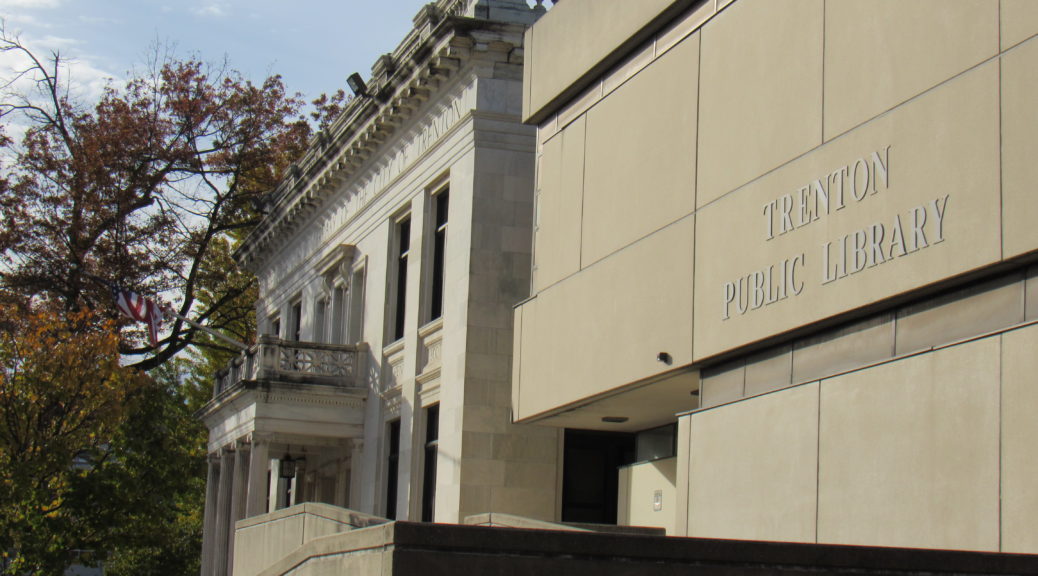By Jared Kofsky

With temperatures in the capital region this summer reaching as high as 96 degrees, Mercer County residents sought shelter indoors during the day from the excruciating heat. In local suburbs, if residents lacked air conditioning on some of the warmest days of the year, local libraries were places to spend the day indoors. In fact, the New Jersey 2-1-1 Partnership recommends that “libraries… and other public air-conditioned spaces are good alternatives in every county if you are looking for a place to cool down.”
However, for residents of Trenton, particularly those experiencing homelessness, such an option did not exist on days when temperatures were at their highest. The Trenton Free Public Library (TFPL) on Academy Street, part of which was built in 1902, was shut down frequently, with closures coinciding with high temperatures.
An analysis by The Streetlight of online announcements by the TFPL found that the library was closed on 12 days during this summer alone due to concerns over heat in the building. On 12 additional days, the TFPL closed early, meaning that for nearly an entire month’s worth of days, the municipal library in New Jersey’s capital was either shut down for all or part of its usual hours of operation.
Patrons who sought the library’s services during the day were often greeted with a sign reading “the library is subject to close at any time during the day due to the temperature within the building.” On Facebook, there were regular posts this summer warning potential visitors that the library will be shut down for the day “due to the excessive heat and humidity in the building.” Although posts on July 25 and 26 and on August 1, 3, 4, 6, and 9 mentioned that “HVAC engineers are on-site working on this issue,” there were closures on excessively hot days throughout the summer, from the end of June until the beginning of September.
Following these shutdowns, it appeared as though an end to the weather-related closures was near, with the TFPL posting online at the end of the summer that a new HVAC system was installed, replacing a previous system that was set up over four decades earlier. The library also thanked the Trenton City Council for assisting with funding the new system.
Yet, just a few months later, extreme weather impacted the TFPL again. On three frigid days before this winter even began, the building was closed to the public due to concerns over the climate control system on the premises.
The Streetlight took the concerns over the closures to Trenton Mayor Reed Gusciora, who stated in an exclusive interview in late November that the problem was being addressed.
“We’ve actually been working on the HVAC system and we are making facility upgrades to the library,” said Gusciora. When asked what was causing the delay, the mayor cited “contractor challenges” and added that secondary fixes are on the way.
“We hope to correct any problems with the library facility in the very near future,” he explained.
The capital is far from the only city in the United States where residents experiencing homelessness rely on libraries for services and shelter during the day. A Washington Post investigation described libraries as the “front line of America’s homelessness crisis,” highlighting San Francisco, Denver, and Philadelphia as examples of municipal libraries that are hiring their own social workers for individuals experiencing homelessness.
In Trenton, while there are a handful of other resources that are open to Trentonians experiencing homelessness, such as the Rescue Mission of Trenton’s Day Center. This facility, which is open daily, serves lunch and offers case management services. However, the TFPL remains a common place for individuals to spend the day safely indoors when it is open.
Unlike other similarly-sized cities in New Jersey, Trenton currently has only one municipal library branch. Although the TFPL used to operate the Briggs, Cadwalader, East Trenton, and Skelton Branches in four of the city’s outer neighborhoods, all four were closed in 2010.
According to Mayor Gusciora, City Hall is figuring out how those libraries can be reopened. When asked for additional details, the mayor stated that the City would require non-profit partners to operate each of the old library branches, such as how Howard’s Healthy Choices is operating in the former Briggs Branch Library.
Facility upgrades are needed, Gusciora explained, mentioning that the City is in discussions with Mercer County officials about possibly having Trenton become involved with the Mercer County Library system.
Still, nearly a decade after the branches were shuttered, when it comes to the TFPL, finances remain a concern.
“The library budget used to be $8 million. It’s down to $2 million so you can readily understand why the branches had to close,” Gusciora told The Streetlight. “The City can’t afford to do it all.”



